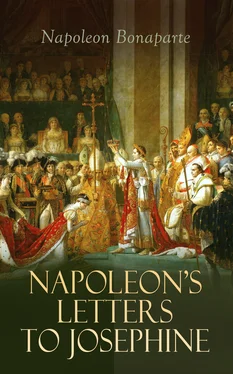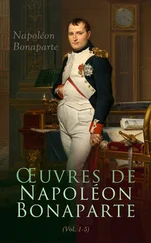I am still at Ancona. I do not press you to come, because everything is not yet settled, but in a few days I am hoping that it will be. Besides, this country is still discontented, and everybody is nervous.
I start to-morrow for the mountains. You don't write to me at all, yet you ought to let me have news of you every day.
Please go out every day; it will do you good.
I send you a million kisses. I never was so sick of anything as of this vile war.
Good-bye, my darling. Think of me!
Bonaparte.
No. 23.
To Josephine, at Bologna.
Ancona, February 13, 1797.
I get no news from you, and I feel sure that you no longer love me. I have sent you the papers, and various letters. I start immediately to cross the mountains. The moment that I know something definite, I will arrange for you to accompany me; it is the dearest wish of my heart.
A thousand and a thousand kisses.
Bonaparte.
No. 24.
To Josephine, at Bologna.
February 16, 1797.
You are melancholy, you are ill; you no longer write to me, you want to go back to Paris. Is it possible that you no longer love your comrade? The very thought makes me wretched. My darling, life is unbearable to me now that I am aware of your melancholy.
I make haste to send you Moscati, so that he may look after you. My health is rather bad; my cold gets no better. Please take care of yourself, love me as much as I love you, and write me every day. I am more uneasy than ever.
I have told Moscati to escort you to Ancona, if you care to come there. I will write to you there, to let you know where I am.
Perhaps I shall make peace with the Pope, then I shall soon be by your side; it is my soul's most ardent wish.
I send you a hundred kisses. Be sure that nothing equals my love, unless it be my uneasiness. Write to me every day yourself. Good-bye, dearest.
Bonaparte.
No. 25.
February 19th.—Peace of Tolentino with the Pope, who has to pay for his equivocal attitude and broken treaty.
To Josephine, at Bologna.
Tolentino, February 19, 1797.
Peace with Rome has just been signed. Bologna, Ferrara, Romagna, are ceded to the Republic. The Pope is to pay us thirty millions shortly, and various works of art.
I start to-morrow morning for Ancona, and thence for Rimini, Ravenna, and Bologna. If your health permit, come to Rimini or Ravenna, but, I beseech you, take care of yourself.
Not a word from you—what on earth have I done? To think only of you, to love only Josephine, to live only for my wife, to enjoy happiness only with my dear one—does this deserve such harsh treatment from her? My dear, I beg you, think often of me, and write me every day.
You are ill, or else you do not love me! Do you think, then, that I have a heart of stone? and do my sufferings concern you so little? You must know me very ill! I cannot believe it! You to whom nature has given intelligence, tenderness, and beauty, you who alone can rule my heart, you who doubtless know only too well the unlimited power you hold over me!
Write to me, think of me, and love me.—Yours ever, for life.
Bonaparte.
March 16th.—Bonaparte defeats Archduke Charles on the Tagliamento.
March 25th.—Bonaparte writes the Directory from Goritz that "up till now Prince Charles has manœuvred worse than Beaulieu and Wurmser."
March 29th.—Klagenfurt taken by Massena.
April 1st.—Laybach by Bernadotte.
April 17th.—Preliminaries of peace at Leoben signed by Bonaparte.
April 18th. —Hoche crosses the Rhine at Neuwied.
April 21st .—Moreau at Kehl.
April 23rd. —Armistice of two Rhine armies follows preliminaries of Leoben.
May 16th.—Augereau enters Venice.
June 28th. —French capture Corfu, and 600 guns.
July 8th. —Death of Edmund Burke, aged sixty-eight.
July 18th. —Talleyrand becomes French Minister of Foreign Affairs.
September 4th. —Day of 18th Fructidor at Paris. Coup d'État of Rewbell, Larévellière-Lépeaux, and Barras, secretly aided by Bonaparte, who has sent them Augereau to command Paris .
September 18th. —Death of Lazare Hoche, aged twenty-nine, probably poisoned by the Directory, which has recalled Moreau, retired Bernadotte, and will soon launch Bonaparte on the seas, so that he may find failure and Bantry Bay at Aboukir (Montgaillard).
September 30th. —National bankruptcy admitted in France, the sixth time in two centuries .
October 17th.—-Treaty of Campo-Formio; Bonaparte called thereupon by Talleyrand "General Pacificator."
November 16th. —Death of Frederick William II., King of Prussia, aged fifty-three ; succeeded by his son, Frederick William III., aged twenty-seven .
December 1st.—Bonaparte Minister Plenipotentiary at Congress of Rastadt, and
December 5th.—Arrives at Paris.
December 10th.—Bonaparte presented to the Directory by Talleyrand.
December 27th.—Riots at Rome: Joseph Bonaparte (ambassador) insulted; General Duphot (engaged to Joseph's sister-in-law, Desirée) killed.
Table of Contents
THE MARENGO CAMPAIGN, 1800
LETTERS OF THE FIRST CONSUL BONAPARTE TO HIS WIFE
| 3rd Outlaw. |
"By the bare scalp of Robin Hood's fat friar, This fellow were a king for our wild faction! |
| 1st Outlaw. |
"We'll have him; sirs, a word. |
|
| Speed. |
"Master, be one of them, It is an honourable kind of thievery." |
The Two Gentlemen of Verona , Act iv., Scene I.
THE CAMPAIGN OF MARENGO, 1800.
Events of 1798.
Napoleonic History.— May 20th. — Napoleon sails from Toulon for Egypt.
June 11th.—Takes Malta; sails for Egypt (June 20th).
July 4th.—Captures Alexandria.
July 21st.—Defeats Mamelukes at Battle of the Pyramids, and enters Cairo the following day.
August 1st.—French Fleet destroyed by Nelson at the Battle of the Nile.
October 7th.—Desaix defeats Mourad Bey at Sedyman (Upper Egypt).
General History.— January 4th. —Confiscation of all English merchandise in France. Commencement of Continental system.
January 5th. —Directory fail to float a loan of 80 millions (francs), and
January 28th. —Forthwith invade Switzerland, ostensibly to defend the Vaudois, under a sixteenth-century treaty, really to revolutionise the country, and seize upon the treasure of Berne.
February 15th. —Republic proclaimed at Rome. French occupy the Vatican, and
February 20th. —Drive Pope Pius VI. into exile to the convent of Sienna.
March 5th. —Capture of Berne by General Brune.
April 13th. —Bernadotte, ambassador, attacked at the French Embassy in Vienna.
May 19th. —Fitzgerald, a leader in the Irish rebellion, arrested.
August 22nd. —General Humbert and 1100 French troops land at Killala, County Mayo.
September 8th. —Humbert and 800 men taken by Lord Cornwallis at Ballinamack.
September 12th. —Turkey declares war with France, and forms alliance with England and Russia.
November 19th. —Wolfe-Tone commits suicide.
December 5th. —Macdonald defeats Mack and 40,000 Neapolitans at Civita Castellana.
December 9th. —Joubert occupies Turin.
December 15th. —French occupy Rome.
Читать дальше












